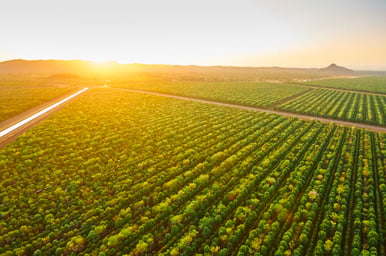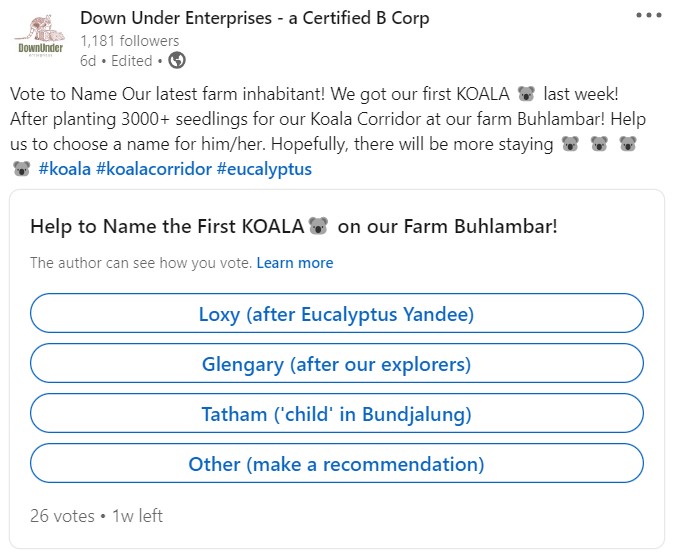Down Under Enterprises grows, produces, exports, and markets traceable
and sustainable native Australian essential oils and botanicals grown on our farm, Buhlambar, and from across Australia offering essential oils and botanicals with unique functional and aromatic properties.
G’day mate,
Welcome to our September newsletter for 2023!
Farmers across the world are facing significant challenges, including high cost pressures and a growing demand for certifications and regulations. The increased frequency of extreme weather conditions is making life extremely tough for farmers who live by their weather apps – usually more than two!
The farming of Essential Oils is critical to the future of Flavors and Fragrances, helping that industry move away from fossil fuel based solutions to a renewable and sustainable transformation. Many factors are hindering the industry's green-focused growth and sustainability initiatives.
This newsletter expresses its gratitude to Alain Frix for his outstanding advocacy and thorough review of the Essential Oil industry. His recent article Essential Oils and Forest Extracts: Complex, Unique and Vulnerable Industries Facing EU Green Deal shared comprehensive insights have greatly contributed to our understanding of this industry.
Read on to learn more:
• Not classified as chemicals – Essential Oils in the EU
• Ancient remedies in revival: Tea Tree
• Our first KOALA🐨needs a name
• Eucalyptus Kochii is China registered
• Dee-Ann and her journey with EOPAA
Enjoy!

Phil Prather
FEATURED PRODUCT
Regulation and Sustainability of Essential Oils
Essential Oils are comprised of plant-based natural organic compounds from plants. They have long been an integral part of human history, through generations of selection and cultivation. Thousands of years later, today’s Essential Oil farmers around the world still base their livelihood upon the benefits of those aromatic plants.
In Australia, Tea Tree (Melaleuca) and other native botanicals have played a significant role in the lives of indigenous communities for untold generations. Click to READ MORE about the story of the Australian indigenous people and their relationship with Tea Tree in our recent interview with Cosmetic Design.
Recent regulatory changes are significantly impacting the Essential Oil industry. These changes are having far-reaching consequences for growers, producers, and consumers.
IFRA 51st Amendment
The International Fragrance Association (IFRA) announced the 51st amendment to the standards in late June, introducing 47 new Standards that specified the use of fragrance ingredients. This extensive expansion of noted compounds is making life more challenging for formulators, impacting traditional selections of Essential Oil ingredients, and requires short timeframes for implementation.
Classified as Not Chemicals
A critical focus of the European Green Deal is the Chemical Strategy for Sustainability (CSS) aims to better protect the health of humans and our planet. However, it is important to strike a balance between regulation and reality. This well-meaning legislation had the inadvertent potential of far-reaching negative consequences for the global Essential Oil Industry.
Preserving biodiversity in Essential Oils and forest extracts is not only an economic imperative but also a means of safeguarding cultural heritage. It is crucial to recognize the socio-economic importance of the Essential Oil Industry, particularly for small and medium-sized, family-owned businesses that have been producing and processing natural products for generations. These businesses, many of which are still based upon the botanical origins of the plants, have been an integral part of cultural heritage for centuries. They provide local jobs in rural areas and contribute to the preservation of biodiversity.
In more recent times, the fragrance and flavor sector has tended towards petrochemical ingredients for their easy access and consistency of production. However, Essential Oils offer unique olfactive qualities and have beneficial effects on human health. They cannot be easily replaced by synthetic substitutes. The preservation of Essential Oils and extracts from forests are important to maintain biodiversity, rural farms, and cultural heritage globally.
Business and Government Partnerships
Partnerships between business and government regulators can generate new momentum and foster the creation of new plantings, as seen in Australia with the support of authorities and industry for the establishment of massive Sandalwood plantations across the continent.
Responsible essential oil production enhances the value and preservation of forests and plants, while also providing local jobs in remote areas.
As new members of the B Corp Beauty Coalition, we heard recently how pioneers in the Beauty and Personal Care industry like Weleda and Dr Bronner’s are already collaborating to source sustainable raw materials, especially botanicals, and to reduce economic and environmental costs along the way.
Full Framework of Sustainability
A myopic focus on carbon footprint is not a guarantee of sustainability. Biodiversity, biodegradability, fair trade, and rural employment are all indicators of a balanced business model.
It is also important to dig beneath the surface to learn what a supplier’s carbon footprint really entails.
Scope 1? Scope 2? Scope 3?
On the surface, a “good” carbon footprint from a local supplier may not be capturing the Scope 3 inputs – let alone exposing the environmental, workers’ rights, and social impact – for their ingredients. Supply chain transparency and traceability of ingredients is critical to answering these questions.
More and more, stakeholders, regulators, businesses, and consumer groups, are working together to find sensible and pragmatic solutions that promote sustainability, preserve biodiversity, and support local communities. By doing so, we can ensure the continued availability of high-quality natural products while safeguarding the livelihoods of millions of farmers and workers.
Down Under Enterprises remains committed to providing you with high-quality, authentic essential oils produced in the most sustainable manner that we know how, and with full supply chain traceability back to our farm. Our team is helping the industry navigate these regulatory changes to ensure the availability of these sustainably produced native Australian botanicals to our customers worldwide.
IN THE NEWS
Ancient remedies in revival
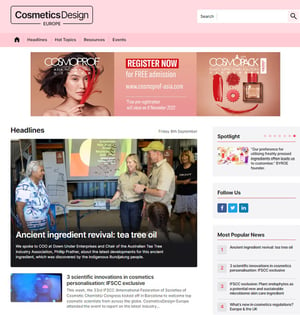 Our COO Phil Prather was recently interviewed by Kirsty Doolan from the Cosmetic Design Europe about the significance of Tea Tree to Australia indigenous communities. Doolan was investigating a current trend of reviving ancient remedies.
Our COO Phil Prather was recently interviewed by Kirsty Doolan from the Cosmetic Design Europe about the significance of Tea Tree to Australia indigenous communities. Doolan was investigating a current trend of reviving ancient remedies.
Buhlambar Farm and Aboriginal Heritage
Tea Tree has a long history of use by the Bundjalung People.
In the Interview, Phil shared the story behind the name of our Farm ‘Buhlambar’ means ‘home of tea tree’ in the local Bundjalung language. He also shared our work with the local Aboriginal Elders and community as part of our Reconciliation Action Plan. The elders have a lot to share about Tea Tree in their stories, ancient learnings, and in their health and wellness. ‘Melaleuca (Tea Tree) holds a special place in the heart of the Bundjaung people’, Phil shares the story about the local story about the Princess of Tea Tree, Eelemani, who dropped Tea Tree seeds along her trail to find her way to return to her home following the white barks which stood out in the moonlight.
Read our blog B Impact Score Community, for more about our involvement with the local communities and growers.
New popular applications of Tea Tree
The downside of the popularity is that there are a series of misconceptions about Tea Tree Oil. The natural remedy of Tea Tree Oil is one of the most studied Essential Oils with plenty of clinical evidence. The misconception might also from adulteration or un proper dealing with Tea Tree Oil.
Read our recent newsletter about Tea Tree and Misconceptions for more.

FARM UPDATES
Help to Name Our First Koala
Our first KOALA 🐨 has arrived!
Over the past six years, we have planted on our farm over 3,000 eucalyptus and other “food trees” that Koalas love. We established a new koala corridor along the 1.5km of riverbank, which forms the northern boundary of our Buhlambar Farm property.
Our eagle-eyed farm manager, Glen, spotted this guy in one of the trees close to our warehouse. Wild koalas are endangered in Australia from threats of diseases, habitat loss, and ongoing climate change - including bushfire.
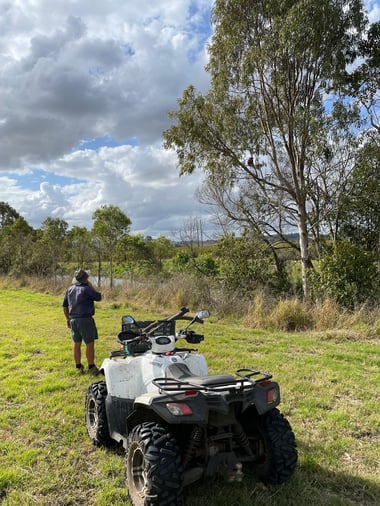 |
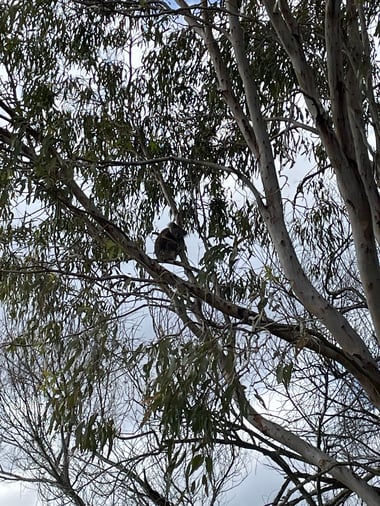 |
We are proud to support the increase in native habitats suitable for koalas and other native Australian animals on our farm.
Click the link to help us to choose a name for him/her🐨.

TRACEABILITY
Eucalyptus Oil – China NMPA Registered
This week, our Eucalyptus Oil (Eucalyptus kochii) became officially registered on the China National Medical Products Administration (NMPA) as a new cosmetic ingredient. This Eucalyptus Oil joins the 16 other Down Under products which already have NMPA registration.
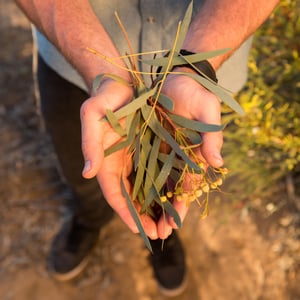
Australia is the home of the entire Eucalyptus genus, and Eucalyptus kochii has the highest natural concentration of 1,8-Cineole among all the known species at >92%. Unlike many Eucalyptus Oils of questionable origins on the market, our Eucalyptus Oil (Eucalyptus kochii) is produced in a fully traceable and sustainable manner. You have confidence in knowing the full supply chain – from our farm to your facility.
Click to learn more about our Eucalyptus Oil.
Eucalyptus Kochii has been intercropped with wheat fields to counter soil salinity issues in Western Australia since the 1990s. These plants now provide a rich, substantial, and sustainable source of Eucalyptus Oil for export.
Click to request a sample of our Eucalyptus Kochii, fully traceable from our farm to your facility.  Registration on the NMPA Cosmetic Ingredients Safety Information Platform, launched in China at the end of Dec 2021, is required for all cosmetic raw materials to be used in China. It requires extensive supporting quality and safety documentation for each registered ingredient.
Registration on the NMPA Cosmetic Ingredients Safety Information Platform, launched in China at the end of Dec 2021, is required for all cosmetic raw materials to be used in China. It requires extensive supporting quality and safety documentation for each registered ingredient.

Talk to your Down Under sales representative or contact us directly to discuss our China NMPA registered products, or any other global regulatory documentation requirements. 

SUSTAINABILITY
Continued electrification of the farm
We add a new toy to the farm and replaced one more tool using fossil fuels. The new electronic whipper sniffer came with 6 batteries and lasts even longer than the old petrol one.
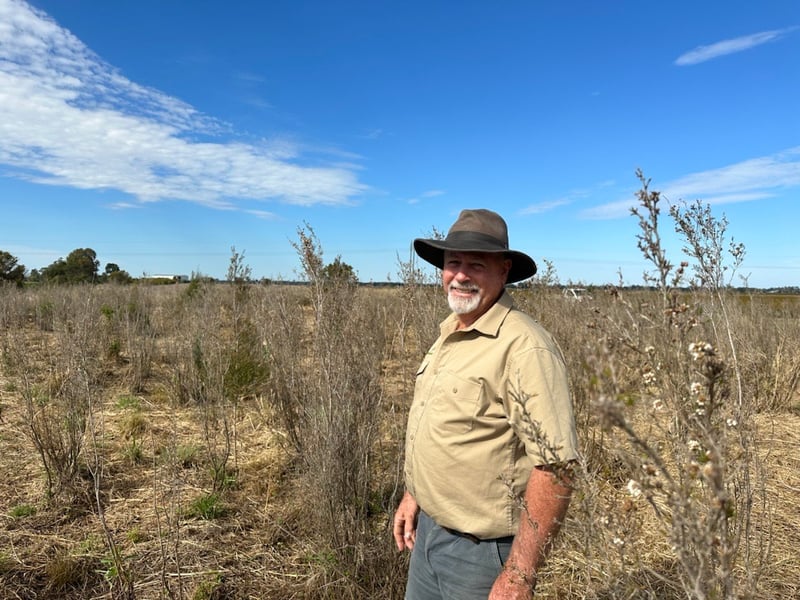
Our farm manager Glen is very happy with the tidy up Fragonia® fields with the new toy.
We have put down the order for an Electric Tractor too. Follow our social media and newsletter for more updates.
THE EVIDENCE
Melaleuca alternifolia’s potential for improve photo-aged skin
 Researchers from the Charité in Berlin and collaborating institutions from Germany and Brazil recently published their human in-vivo trial results using a Tea Tree Oil to successfully address photo-aged skin.
Researchers from the Charité in Berlin and collaborating institutions from Germany and Brazil recently published their human in-vivo trial results using a Tea Tree Oil to successfully address photo-aged skin.
This double blinded, randomized controlled clinical trial enrolled 40 male participants aged 18-28 for a 90 day study duration. A conventional Tea Tree Essential preparation at 2% and a 2% Tea Tree Oil nanoemulsion preparation were topically delivered to study participants. The researchers identified an improvement of photoaged skin for both study arms versus placebo.
Tea Tree Oil provides the potential to improve photoaged skin, where the application of the nanoemulsion achieved results at deeper skin layers.
Hugo Infante, V., et al. (2023). "Cosmetic formulations with melaleuca alternifolia essential oil for the improvement of photoaged skin: A double‐blind, randomized, placebo‐controlled clinical study." Photochemistry and Photobiology 99(1): 176-183.

EMPLOYEE'S PROFILE
Uncover Dee-Ann and her vibrant role with EOPPA
What's your involvement with Essential Oil Producers Australian Association (EOPAA)?
| Dee-Ann introducing her favorite oil Lemon Scented Tea Tree |
I sit on the EOPAA Committee as a volunteer to represent all Australian Essential Oil growers. The excepted oil is Tea Tree Oil as this oil falls under ATTIA. I actually can’t remember how long I’ve been sitting on the committee, but it would be at least 6 years. I’ve served as President and Vice President previously.
What's your most memorable moment with EOPAA?
My most memorable moment is the sense of camaraderie amongst the essential oils at the annual AGM.
Some background about the Australian Industrial Chemicals Introduction Scheme (AICIS) and Essential Oils?
From July 2020 AICIS starts to replace the previous National Industrial Chemicals Notification and Assessment Scheme (NICNAS) as the regulatory framework for introducing industrial chemicals into Australia. Under the AICIS regulations, so called ‘naturally occurring chemicals’ do not need to be registered.
However, the vast majority of essential oils derived from steam distillation or solvent extraction were not considered "naturally occurring" and need to be registered by September 2022. It significantly impacts members of the Essential Oils Producers Association of Australia (EOPAA) by creating a large financial barrier to innovation and growth in the production of new and existing Australian essential oils. While vast section of the essential oil producing regions were devastating impacted by the floods of 2022.
Registration under AICIS requires substantial fees for each oil - ranging from $7,435 to $34,965 per oil. Additional costs for testing and data collection are estimated to be between $10,000 to $80,000 per oil.
The financial costs of AICIS directly contradict encouraging innovation and increased production in the emerging Australian essential oils industry.
What's the latest update about the EOPAA response to the AICIS requirements?
The EOPPA has been mitigate with AICIS and submitted a formal submission for the requirement of the AICIS registrations of Essential Oils with 3 major suggestions:
1. Request an industry-wide moratorium on the enforcement of these new requirements for a period of 2 years.
2. Looking for ways to reduce or waive the application cost for essential oil products, particularly these small family-owned businesses.
3. suggest AICIS considers implementing a grouping system for identical essential oils, similar to the practices in the New Zealand Inventory of Chemicals (NZIoC).
Our story
Down Under Enterprises grows, produces, exports, and markets traceable
and sustainable native Australian essential oils and botanicals grown on our farm, Buhlambar, and from small growers across Australia producing unique essential oils and botanicals from plants native to Australia.

